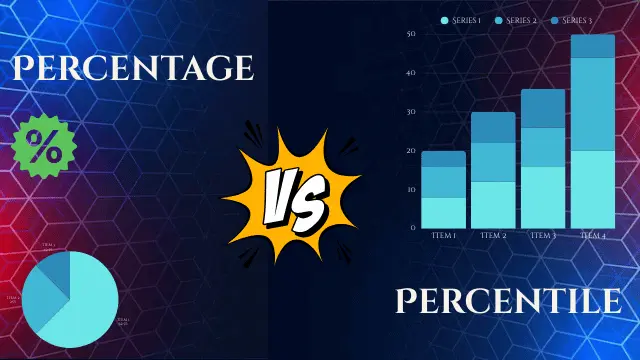Percentage vs Percentile – What Students Should Really Know
The paper showed “72% correct” and “89th percentile” side by side.
My first thought? There is an issue here.
How could I get nearly three out of ten questions wrong but still rank in the top of test-takers? It made no sense. When I called to ask, the person on the phone laughed. Apparently, I wasn’t the first confused student that week.
That’s when I learned something that completely changed how I look at test scores:
👉 Percentage = How much you knew
👉 Percentile = How you ranked against everyone else
Simple, right? But the implications are huge.
What is a Percentage?
The percentage tells you how many questions you got right out of the total.
It measures your raw knowledge.
Example: If you scored 72 out of 100, that’s 72%.
Percentages matter in:
- GPA and report cards
- Scholarships
- Professional certifications
- Any test where knowledge itself is the goal
What is a Percentile?
The percentile shows your academic performance as compared to your competitors.
The main aim is to get higher marks from the total score.
Example: It’s calculated as compared to other people also. For the 68% percentile, then this means you scored better than 68%of the other people.
Key Difference Between Percentage and Percentile
Here’s a quick way to remember the difference:
| Metric | What It Means | Example |
| Percentage | Obtained Marks divided by total marks | 60% = 60/100 correct |
| Percentile | Your performance as compared to others | 59th percentile = performed better than 59% of your competitors |

When Percentage Matters More
Percentages aren’t useless. In fact, they’re critical in many cases:
- GPA & Report Cards → Shows consistent performance.
- Scholarships → Committees love students with high, steady percentages.
- Professional Exams → Some certifications care only about how much you know, not how you compare.
When I applied for scholarships, percentages mattered more than percentile rankings. Committees wanted proof of consistent academic strength, not just test-day luck.
When Percentile Matters More
Percentiles shine in competitive settings:
- College Admissions → Schools like Harvard use percentiles to sort through tens of thousands of SAT/ACT scores.
- Job Applications → In crowded markets, HR filters candidates based on percentile rankings in assessments.
- Graduate School → A lower GPA can be offset by a strong percentile on the GRE or GMAT.
That’s why my 72% score with an 89th percentile looked better to business schools than my friend’s 84% score with a 78th percentile.
Common Mistakes Students Make
I’ve seen students make the same mistakes over and over:
- Thinking 90% always beats 75%.
Not true. A 75% on a hard test can rank higher than 90% on an easy test. - Skipping small quizzes and competitions.
These also reflect in your performance patterns. - Chasing percentile only.
Some students focus on beating others but neglect actual understanding. That backfires later in college and jobs.
Easy to Use Tools
Practical Tips for Students
Here’s what works best:
- Track both numbers. Keep a simple log of your percentages and percentile scores.
- Adjust your strategy. Study deeply when percentages matter (classwork, GPA). Practice test-smart strategies when percentile matters (standardized exams).
- Don’t ignore either. You need solid knowledge and competitive performance.
| Feature | Percentage | Percentile |
| Definition | Shows how much you scored out of 100. | Tell your performance as compared to other competitors |
| Formula | (Marks Obtained ÷ Total Marks) × 100 | Rank ÷ Total Candidates × 100 |
| Example | 72% = You got 72 marks out of 100. | 89th percentile = You scored better than 89% of students. |
| Focus | Knowledge/accuracy of what you knew. | Position/rank among other test-takers. |
| Used In | School exams, GPA, scholarships. | Competitive exams, job tests, and college admissions. |
| Interpretation | A higher % always means a better score. | A higher percentile doesn’t always mean a higher percentage which depends on difficulty & peer performance. |
Conclusion
Your percentage says: “Here’s what I learned.”
Your percentile says: “Here’s how I compare.”
Both matter, but in different situations. The students who succeed aren’t the ones who obsess over one number. They’re the ones who understand when to focus on percentages and when to focus on percentiles, and adjust their strategy accordingly. If you keep that balance, you’ll not only get better grades but also perform stronger in admissions, jobs, and beyond.
